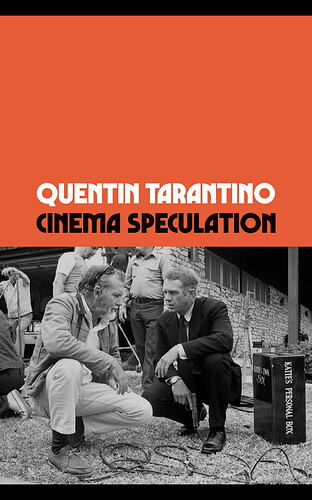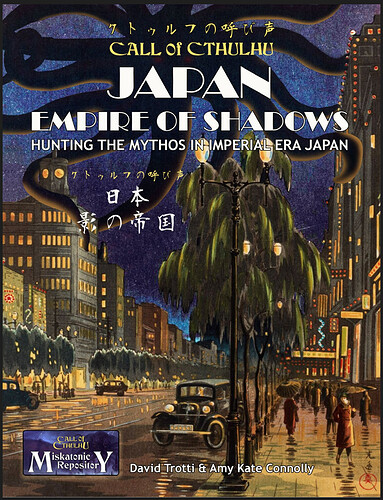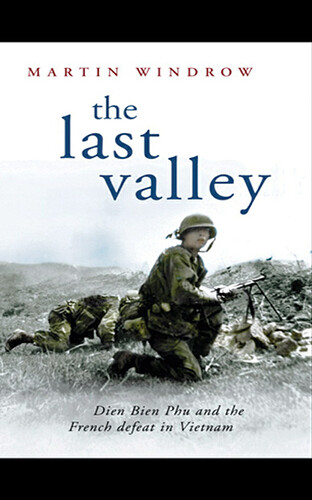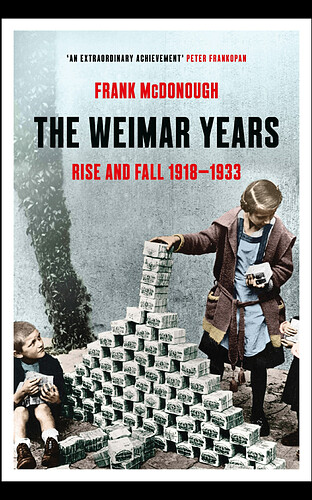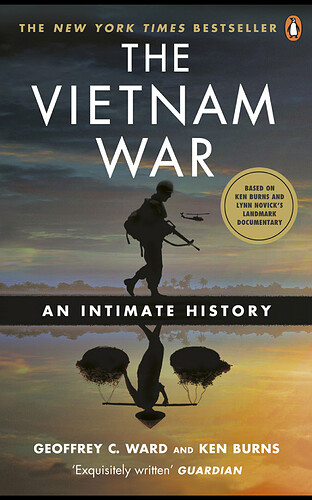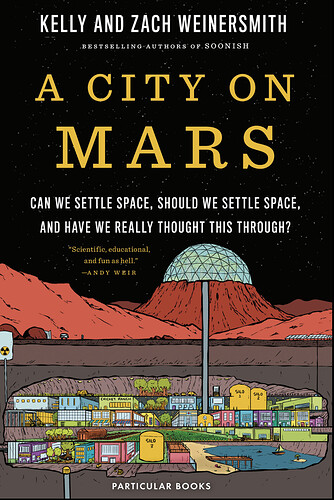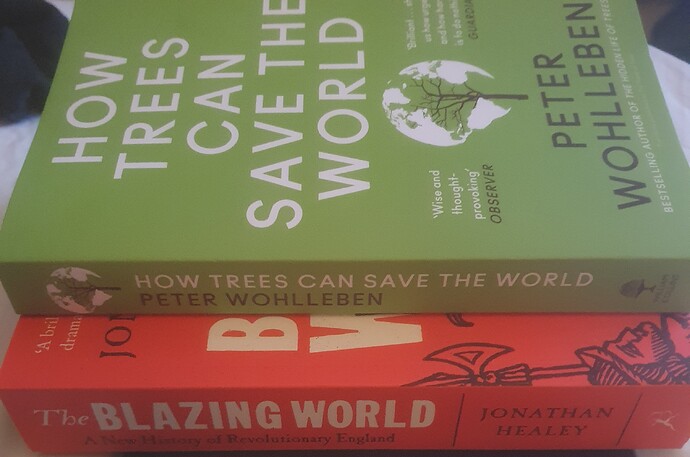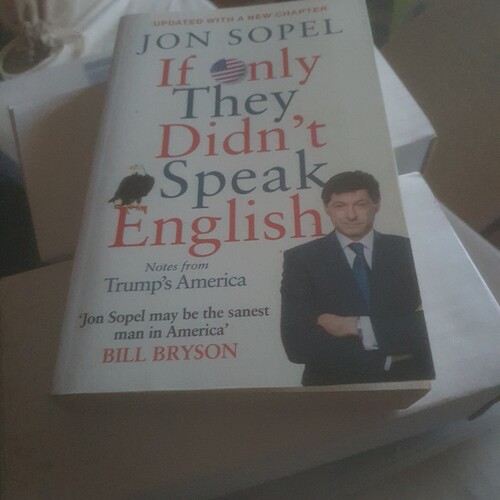And I have now read it too. So very good.
As much as he irritates me, he knows film quite well, and it’s immediately obvious how fundamental his love of film is. Well worth a read if you like any of the films discussed, and have a less than encyclopaedic knowledge of the films of the era.
He really irritates me as well, but I’ve been considering this since it came out. I wish the library had this so I didn’t have to buy it…
Definitely worth a loan. See if your library will get it in, they’re usually happy to buy or inter-library loan books (speaking as a former librarian).
I couldn’t justify buying this for a while, as my investigators are balls-deep in a very long campaign right now, and there’s no way for me to involve Japan or move things there, but in the end my resistance crumbled, I picked it up, and I’m glad I did. 400 pages of information, plus multiple packs of maps and handouts, means you are well supported if you try to run an adventure in 1920s Japan, which is a fascinating-enough setting to involve anyone who has even the slightest curiosity about it. The book has three scenarios in it, and they make a wonderful change from the usual Sengoku or modern eras that Japanese scenarios usually get. Even though I am well acquainted with Japanese history, I still discovered some new information, and the detail about locales (especially outside of Tokyo) is completely my jam. The Japanese art throughout is choice.
Of particular delight, as a former aikidoka, was to see the founder of the martial art and his far-right ties to militarists, fascists, organised crime, and secret societies, all get a mention, however minor. I’m going to crowbar all this stuff in somehow, later rather than sooner, but still.
I am listening to “Empire of Pain” as audiobook, absolutely brilliantly written (and read) in the German version, but I assume the English version is of the same quality… an absolute must read if you are somehow affiliated in the medical field…
I am far from through with it, but I am just blown away of how well this book is written and researched… Broadly speaking, it is addressing the corruption of politics, FDA, physician, media, through the pharma industry, from the early beginning of industrial pharmaceuticals post WW2, up until our modern days and the opioid crisis… It is written in a very captivating way, as if you were reading a crime story, only based on real people and events.
Edited for minor language corrections
Still the book on Dien Bien Phu, as far as I’m concerned. An epic battle and pure feat of endurance on both sides. Highly detailed, well-researched, and captivating.
Kind of a prequel volume to his earlier volumes on Hitler, this time taking a more general view of the boiling-over bullshit pressure cooker that was Weimar Germany. The numerous failed coups, hundreds of political assassinations, extensive political reforms that first showed promise and then turned nightmarish. Very approachable, surprisingly deep.
Not the most in-depth work, but engagingly written. There is some overlap and repetition, which is unfortunate, as the book isn’t simply a narrative progression through the years, containing some otherwise well-constructed digressions on figures like Ho Chi Minh and Ngo Dinh Diem.
Finally finished the Expanse series and really enjoyed it. The only thing that sucks about finishing a long series like that is I’ll miss the characters. I read all nine books over the last couple of years, so it’s going to be kind of weird to not read about those people any more.
Agreed. Double-edged sword, for sure. On the plus side, at least it A) actually finished and B) stuck the landing.
I’d much rather feel the loss at journey’s end than deal with the crap that the likes of Martin and Rothfuss give us.
Declare by Tim Powers. It’s been mentioned here many times. I wish it was just a spy thriller. He’s an excellent writer. Great characterization, imagery, and clearly well researched. But suspension of disbelief doesn’t kick in for me when it comes to the supernatural.
I just shouted “BOOO!” aloud.
So, uh, confession time: I realized yesterday that Crooked is not the first Tim Powers book I’ve read, because it’s by Austin Grossman. Not sure how long I’ve had that misattributed in my head.
Been reading some Guy Gavriel Kay stuff that’s essentially historical fiction, but with just a smidgeon of magic and with enough of the serial numbers of history filed off that he can tell whatever story he wants. I’d read A Brightness Long Ago a couple years ago, and recently returned to not-quite-Renaissance-Italy for All the Seas of the World and Children of Earth and Sky, which I unintentionally read out of order. Fortunately, the only thing about that which was a problem was that I was a little disoriented at the beginning; they stand alone very well, with neat connections between but nothing crucial. I quite like these books, largely because of how stereotypically Canadian they feel to me. There are bad folks and a hard world which provokes characters into some cynical insights, but people often seem to be unexpectedly virtuous, and frequently grow moreso rather than descending into corruption or self-centered evil. Anyway, it turns out my wife bought some of his stuff a while ago, so I already own The Lions of Al-Rassan, so that’s probably next.
I remember absolutely loving Tigana a million years ago, may be time for a reread!
Not what I was expecting. A dense thoughtful book on space colonisation where the answer to the subtitle is basically “no”, or at least “not without a lot more research into fields that might surprise you”. I did particularly appreciate the section purely about international space law.
If Elon Musk does ever drag his ass off to Mars, probably the year after FSD arrives, on the basis of this book he’ll provide a good example of how not to do it.
ETA: also another bunch of books about running which I omit so as not to seem obsessive or anything.
Tastes vary, but this is rather like saying Harry Potter would have been a perfectly good boarding-school novel without all the wands-and-cod-Latin nonsense.
I don’t know what to tell you. Angels and genies don’t do it for me. This is this first Tim Powers book I’ve read so maybe he’s the JK Rowling of the supernatural and paranormal and I should have known better. I don’t typically read that much fantasy or horror. But everyone here seemed to have positive reviews so I gave it shot. But the book is a combination of historical fiction, spy thriller, fantasy, etc. I really enjoy his writing style but would have preferred something like a le Carre espionage story. That was all I was trying to say.
The Tainted Cup by Robert Jackson Bennett.
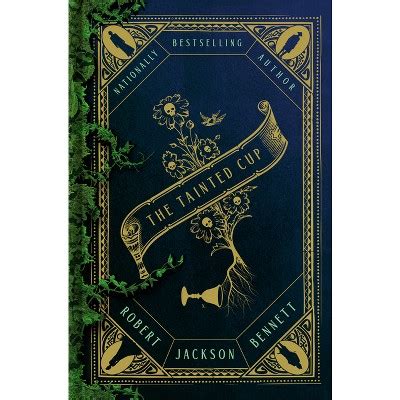
Despite the stupid title, this is very good fantasy, quite well-paced and featuring two appealing and interesting main characters. These two characters lend it a sort of Holmes/Watson air, as one is a brilliant and eccentric detective who usually wears a blindfold, with the other being her young and surprisingly adept assistant. So it is a mystery as well as a fantasy, and it doesn’t suffer for trying to blend the two genres at all.
It spoils nothing to tell you that the setting is very close to some very high man-made walls on the shores of some nameless ocean. The walls are there to keep the pesky leviathans from running roughshod over the kingdom. That makes the leviathans sound small, which they are not, they are impossibly large and very hard to stop. The fact that, for lack of a better phrase, leviathan beaching season is just getting underway, gives the mystery-solving a sense of urgency and even doom.
The magic system and fighting system are both handled very well (the author is a veteran and successful writer, though I’ve not read his other work), and the world-building, while slightly rough at first, clicks in pretty well and becomes nicely absorbing. The mysteries are satisfying, very layers-of-an-onion type of thing, and threats come from all directions. Some of the secondary characters are a little too black and white, but most of them are layered and enjoyable.
In all, I give it an A.
What makes the book for me is the brilliant historical fiction, incorporating real history in large amounts, alongside the ‘secret history’ Powers creates. The synthesis of the two is what makes it special, for me and for most of the others I’ve talked to about it. We just feel like you’re missing out!
The Blazing World is one of the most exciting books of history I’ve read in a while, detailing a time of social upheaval, religious unrest, culture and actual war, changing attitudes, and so on and so forth, yea verily tis just the modern day, as people talk of liberty against tyranny, and the abrupt about-face circumstances force on them.
How Trees Can Save The World provides a compelling argument for the effective ‘rewilding’ of large swathes of land. Isolated tree planting is good but not enough, and deforestation counteracted by tree planting is destroying ecosystems and is a non-workable cheat; tree forests sequester more carbon the older they get, for hundreds of years, and so while you may be replacing that 300-year-old beech with a new beech, you won’t actually have balanced chopping down the original tree until 2324. The increasing greed for raw materials, combined with the growing use of wood as ‘ecologically friendly’ when that is at best lip service, is contributing to a disastrous imbalance furthered by pollution and climate change. While the book is quite Germany-centric, it’s divided up into small, bite-size chapters and is eminently readable. I find the arguments compelling and worthwhile, but I also know in my heart that we absolutely will not do it, which made the book an incredibly depressing read for me.
I feel like How Trees Can Save The World should be Kindle-only…
In theory this should be right up my street, but the slightly patronising, superior tone makes me think I would be asking Sopel to step outside where he could more easily see my knuckles up close, after talking to him for five minutes. Seeing America always at a slight remove, almost as a source of entertainment, is a slightly dismissive way of regarding the whole situation; even if it arises from his professional training as a journalist, I don’t appreciate it. I think being slightly laconic towards everything even when it is not only blowing up in your face but is explicitly targeting you, is a big fucking mistake. I won’t get into his odd blindspots, like talking about how continental Europe turned against monarchs but the UK never did (we fucking decapitated a king in 1649, which, using my degree in time travel, I found was before the French Revolution). One of those books I should like more, but the tone is grating.
